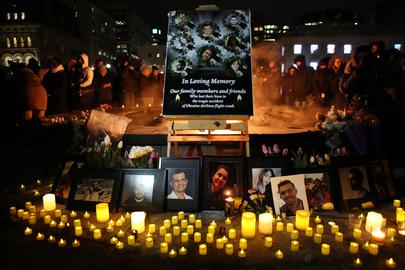Nizam Missaghi is an Iranian-American physician. Due to being denied access to higher education under the Islamic Republic as a member of the Baha’i community, he left Iran at 18 to obtain an education. He obtained his undergraduate bachelor’s degree in Biochemistry and Middle Eastern studies at the University of Virginia. He pursued his medical education at the Medical College of Virginia. Nizam currently practices in Arizona and is also a clinical assistant professor at the University of Arizona School of Medicine. He has a keen interest in human behavior and psychology and has delivered lectures and written articles on related topics.
As the crescendo of Iran-related negative news is broadcast, significant reactions are felt and expressed beyond Iran’s borders. While Iranians in the diaspora have a varied response ranging from silence to audible keyboard activism, the recent downing of the Ukraine flight drew a far more uniform and raw reaction than other negative news. This article examines and analyzes the reasons that animate and define the loudness of the response among Iranians outside of Iran.
At first glance, “selective sympathy” appears to be an unusual construct; after all, sympathy, that reciprocal impulse of compassion and commiseration at times of sorrow or tragedy, makes us distinctly human and is universal. The universality of sympathy, however, does not mean that it is experienced or expressed to the same extent or proportion as the tragedy at hand. In other words, many factors, conscious and subconscious, go into how one experiences sympathy internally and expresses it externally beyond the severity of the misfortune that may have befallen our fellow human beings.
Every loss of life should be treated equally in how it receives our sympathy. But it is human nature to express more sympathy and be genuinely more affected by stories with which we have some connection. The stronger the connection, the stronger our reaction and expression of sympathy. The strongest form of sympathy goes beyond expressing sorrow at a loss. Such sympathy has physiological manifestations such as increased heart rate, blood pressure, insomnia, restlessness, gastrointestinal upset, and inability to function.
Much has been written about selective sympathy from the Western lens. Articles have studied why we react to attacks in Europe far more significantly and change our social media profile pictures in expressions of solidarity, but are relatively undisturbed by Boko Haram’s abductions and killings of young girls in western Africa. Such articles generally point to the media, which may overreport some attacks to selectively draw more attention to Western targets. They also note that there may be implicit racism as well as cultural and religious affinity that determines the expressions of sympathy and solidarity. There is also the surprise factor. If Iraq is generally seen as a place that is prone to instability and violence, a much larger catastrophe in scope must occur there to garner the attention of the Western eye rather than a similar event in a place that is deemed safe and “civilized”.
On January 8, 2020, Ukraine International Airlines flight 752 was shot down shortly after take off near Tehran. After three days of denials, the Islamic Republic Revolutionary Guard Corps admitted that it had shot down the plane through “human error” amid heightened tensions in the region. Aboard this flight were mostly educated Iranian immigrants with academic positions, graduate or post-doctoral roles, along with their families and children. While the international community expressed condolences, anger, and disbelief, the reaction of the Iranian community in the diaspora is the subject of this article.
Iran frequently is home to demonstrations and state-sanctioned violence against defenseless citizens. While another disaster from a disaster-prone nation should not be much of a surprise, the Iranian community’s reaction in the diaspora was palpably strong, unified, and raw. Less than a month prior to the downing of the plane, during nationwide protest sin Iran sparked by fuel price rises, some 1,500 defenseless Iranians were shot in various cities and over 7,000 were arrested, some of whom reportedly later died in detention. The hair-raising exasperation, the indignation, and vulnerability that emerged after the plane crash, however, was unmatched by any other reaction in recent memory; this despite the deaths during the protests, for example, seeing a far higher loss of life.
What are some of the reasons behind the disproportionate and selective sympathy?
The Media Influence
The deadly demonstrations in various Iranian cities received little Western media attention. Iran’s state-controlled media deliberately provided zero coverage while the Iranian government shut down the Internet to limit the flow of information outside of Iran. So while the coverage of the plane crash was widely seen, coverage of the far deadlier demonstrations was limited to shaky and grainy mobile phone clips that seemed less reliable and easier to overlook with far less reach beyond Iran’s borders.
Mass media uses powerful images that focus attention on some victims over others. A visual of the wreckage from the plane, the damaged red shoe of a little girl, lost in the field, and the spectacle of body bags amidst a field of fire draws far more sympathy than those who die quietly and unseen in the dark chambers of Iran’s Evin prison.
Justification for Complacency
When adverse news emerges from Iran about detentions, shootings, and blood on Iranian streets, there are narratives of possibilities that may tame the reaction in the Iranian observer outside of Iran. For example, it is convenient to justify that the person who was shot may have resisted arrest, damaged public property, or vandalized a bank. There is also an assumption of free agency. The person who takes to the streets, does so on his own volition. If he faces consequences, the justification is that he was aware of the risks when he joined the demonstrations. This lessens the need for expression of sympathy.
Alternatively, when a dual-national citizen visiting Iran gets arrested and is charged with espionage, some Iranians remain silent because they feel they cannot be sure whether or not the person was truly a spy. So, they may justify remaining silent and not changing their profile pictures or spreading news about the arrest. After all, the dual citizen could have chosen not to visit Iran, in their estimation. However, those aboard Flight 752 had no control over the fate of their aircraft. Therefore the sympathy intensifies, the candlelight vigils proliferate, and profile pictures go pitch black.
Race and Religion
The issues of race and religion play a part in the display of sympathy. Iran severely discriminates against its religious minorities. It arrests, tortures, assassinates, executes, and confiscates with impunity. But when the news of a young man receiving a 16 year sentence for practicing his faith emerges, the sympathy is muted. The reason is that belief is seen as a deliberate act. He can choose not to believe and not suffer in the unsympathetic eye. Additionally, those who believe differently feel less connected to this man, so they show less sympathy. A similar phenomenon of lack of connection occurs when news emerges that the province of Sistan and Baluchestan has experienced devastating floods with hundreds of missing families. The sympathy is diminishes since most Iranians have never visited that province, speak a different language than the victims, have a different appearance from them, and practice a different religion. These multiple degrees of separation mute the sympathetic reaction. Additionally, a flood is seen as an unavoidable matter. By contrast, the shooting down of a plane due to “human error” raises the ire of the Iranian spectator abroad.
The Cost of Sympathy
In response to many disasters happening within Iran, the Iranians in the diaspora are generally silent. There is a cost to expressing indignation loudly on social media. The belief is that Iranian intelligence services widely monitor posts by Iranians outside of Iran. Those who hope to visit Iran at some point in the future wish the authorities to have no “dirt” on them so they can have a pleasant visit. As such, a strong outward expression of sympathy to most injustices may be seen as political activism and could be punished. Such fears affect the outward expression of sympathy.
Additionally, there are those Iranians who feel that spreading any negativity about Iran plays into the hands of Iran’s adversaries and raises the specter of war, so they choose silence. The downed Ukrainian flight is different: Iran has, after its initial denials, declared it was due to human error and its president had called it an “unforgivable mistake”. The cost of expressing anger, frustration, and sympathy is low, so it is ubiquitously in the posts and profile pictures of Iranians in the diaspora. This silence out of fear of future retribution by the Iranian government is also seen in how Iranians in the diaspora readily express grief at the human toll of a natural disaster such as an earthquake yet choose silence regarding a misguided or violent policy employed by the Islamic Republic that leads to the loss of human life.
The Mirror of Self
The more the similarity between the victims and the observer, the more intense the sympathy. Much like the victims of that doomed flight on that fateful day, the average Iranian in the diaspora has experienced the pains of immigration and leaving their families fragmented across continents. The observer outside of Iran sees himself in the same shoes. He could have walked through the same airport, bid farewell to his loved ones, and been aboard that same flight with his dreams of a brighter future. He could have had loved ones waiting for him in the US or Canada. He could have played every card carefully, disabled his social media when visiting Iran, not engaged in political conversations, and observed the draconian laws of the land to ensure his ultimate safe departure from Iran. When such assumptions do not lead to the expected outcome, there is disbelief and grief.
In summary, sympathy in its highest form should be about the equal and inherent importance of every human life. The type of sympathy and grief that finds its expression only in one’s own tribe, race, religion, culture, political persuasion, or geographic proximity is unwholesome and unprincipled. Let us all take the time to reflect, discover our biases, and contemplate and resist the inequitable status quo that is uncritically on display.
Sympathy should singularly rest in the value of human life. While selective sympathy is certainly preferable to no sympathy at all, one should be keenly aware that some sympathy may be more a manifestation of the narrative of self rather than genuine concern for the human condition.
visit the accountability section
In this section of Iran Wire, you can contact the officials and launch your campaign for various problems




















comments